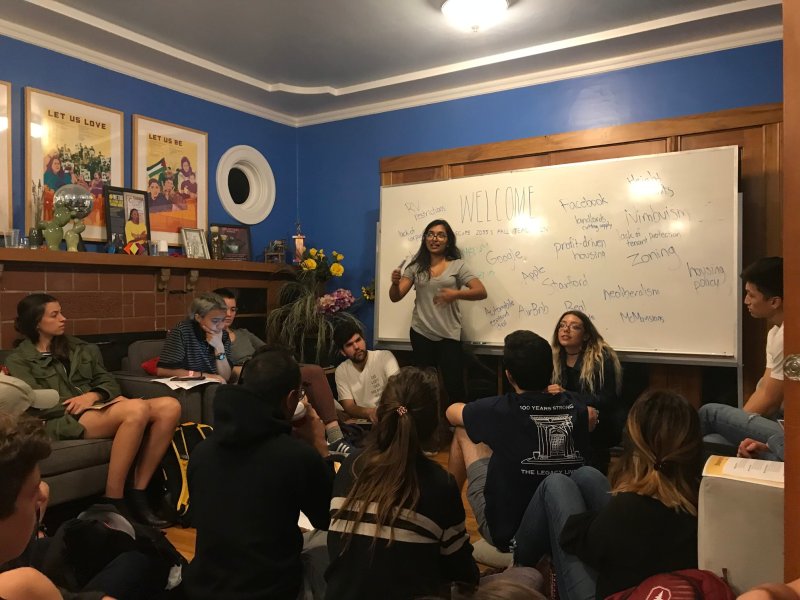On Wednesday night, the Stanford Coalition for Planning an Equitable 2035 (SCoPE 2035) hosted a teach-in and open meeting in Harmony House to discuss the current state of housing, affordability and workers’ rights at Stanford and in the Bay Area.
SCoPE 2035 began the event by giving those in attendance an opportunity to share in groups their own experiences with gentrification and housing affordability both at Stanford and in their home communities, before sharing their own takes on the issues.
Affordable housing
SCoPE 2035 first celebrated Santa Clara County’s recent decision to pass the Affordable Housing Ordinance, which increased the fee that Stanford would need to pay for each square foot of housing they build from $36 to $68. The members emphasized the role of their work emailing county supervisors and phone banking to promote the ordinance.
SCoPE 2035 also supported the County’s decision to pass the Inclusionary Housing Ordinance, which requires 16 percent of all market-rate students and staff housing to be low-income.
The members claimed that, prior to the County’s decision, the University sought to enter into a development agreement with them that would allow Stanford to negotiate directly with the County on affordable housing issues.
“The development agreement would allow Stanford to negotiate directly with the county about affordable housing,” said Nova Meurice ’21.
The University initially proposed the creation of 200 new affordable housing units for staff and postdocs, an immediate payment of $14.3 million to Santa Clara upon approval of the 2018 General Use Permit (GUP) for the creation of low-income units as well as the establishment of an Evergreen Capital Fund of $21.7 million to subsidize regional housing construction and construction of 434 additional units.
SCoPE 2035 then criticized the University’s promise to withdraw this proposal following the ordinances’ passing.
“Because this proposal is intended to obviate the need for traditional legislative mechanisms, this proposal automatically is rescinded if the County adopts an affordable housing fee ordinance or inclusionary housing ordinance that applies to Stanford’s lands,” the University wrote in a July 27 letter to the County.
“[Stanford is] a real estate developer and [it] will push to get what [it] want[s],” said Matt Nissen ’20.
Stanford publicly expressed disappointment in response to the County’s decision to pass the ordinances.
“Enacting this fee will delay by up to a decade the delivery of more affordable housing, and therefore will not address the acute housing shortage the region faces now,” McCown wrote in Sept. 27 statement to The Daily.
The Daily has reached out to University spokespeople for updated comment.
SCoPE 2035 also discussed the general state of housing and affordability in the surrounding areas. Most prominently discussed were the disproportionate amount of evictions experienced by ethnic minorities, the high ratio of low-income jobs to homes and the tendency for new housing to be built for high-income families in the area.
“Redwood City is building three times the housing that is needed for families that make more than $100,000 per year,” said Eva Reyes ’19. “They have built 20 percent of what they are supposed to have built for anybody that makes less than $110,000 per year.”
Workers’ issues, anchor institutions
Another topic of discussion was the treatment of workers and dining hall staff on campus.
Speakers mentioned an inability for many workers to live near campus, resulting in many hour-long commutes. They handed out a heat map which showed that some workers live as far as Manteca, 80 miles away from campus.
SCoPE also stated that dining hall employees were not permitted to go to protests or wear stickers in promotion of Indigenous People’s Day.
However, R&DE stated that they received no reports from Stanford Dining managers of sightings of stickers related to Indigenous People’s Day nor requests to attend related events, according to Breeland.
SCoPE 2035 member Sefa Santos-Powell ’21, also claimed that workers are disincentivized to join unions because their pay is higher if they do not, to which Breeland contested.
“We believe there is a strong incentive for workers to seek permanent positions, including positions that are part of the bargaining unit, and we encourage them to do so,” she wrote. “While some casual employees (working on an “as needed” basis) earn more per hour than some full-time employees represented by the union, bargaining unit employees enjoy a long list of benefits that casual employees do not.”
Lastly, SCoPE 2035 expressed its desire for Stanford to become an anchor institution, something it defined as universities that have a long history in a community and that engage with and support the local community. They provided examples of six universities that they said fit this description.
The Duke-Durham Neighborhood Partnership, for example, works with the 12 neighborhoods and nine schools closest to the Duke University campus to promote affordable homeownership, quality healthcare, educational achievement, youth outreach and neighborhood safety.
“They’re doing this not only for themselves and the communities around them, but with them,” said Erica Knox. “Stanford may want you to think this is impossible. There are lots of examples of how this has been successful in the past.”
This report has been updated to include the perspective of R&DE, who refutes claims that workers were not permitted to wear stickers or attend events related to Indigenous People’s Day and that workers are disincentivized to join unions due to the prospect of lower pay.
Contact Tyler Johnson at tjohn21 ‘at’ stanford.edu.
